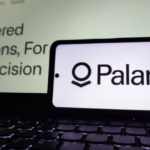The need for AI in cybersecurity is paramount in today’s digital age. Cyber threats are becoming increasingly sophisticated and frequent, making it challenging for traditional security measures to keep up. AI enhances cybersecurity by automating the detection of threats and anomalies, reducing response times, and handling the vast amounts of data involved in monitoring network activity. It can identify patterns and learn from them, enabling it to predict and prevent future attacks. Thus, AI not only strengthens defenses but also enables proactive security measures, making it an essential tool in the fight against cybercrime.
Table of Contents
Cybersecurity, traditionally a field dominated by manual processes, is undergoing a transformative change. The conventional methods of manual monitoring, incident response, and threat hunting often led to delays, increased exposure, and heightened vulnerability to cyber threats.
However, the advent of artificial intelligence (AI) has marked the beginning of a new age. The rapid progress in AI capabilities promises significant advantages across various organizational domains and missions within the AI cybersecurity ecosystem. By automating tasks that were previously labor-intensive, AI has the potential to revolutionize cybersecurity workflows, creating efficient, autonomous processes that speed up remediation and strengthen defenses.
Why do We Need AI in Cybersecurity?
- Strengthened defense and remediation capacities by detecting nuanced attacks, fortifying security protocols, and swiftly addressing incidents.
- Time efficiencies are garnered as AI accelerates detection and response cycles, swiftly assessing risks, and empowering data-driven decisions for analysts.
- Enhancement of brand reputation and trust in an organization’s security measures.
- Improved job satisfaction among cybersecurity professionals, enabling them to concentrate on advanced tasks instead of labor-intensive, manual operations.
Advancement of AI in Cybersecurity
The incorporation of AI in cybersecurity offers substantial benefits for government and business leaders tasked with protecting systems, individuals, and communities from persistent cyber threats. Serving as a force enhancer for experienced cybersecurity professionals, AI plays a crucial role throughout the cybersecurity lifecycle. Its functions include monitoring large data sets to identify subtle adversarial attacks, evaluating risks associated with vulnerabilities, and facilitating data-driven decision-making during threat hunts.
AI-Integrated Cyber Future
Looking ahead to a future fortified by AI in cybersecurity, several crucial considerations emerge:
Meeting Heightened Security Needs: AI expands the horizons of cybersecurity, especially in defense and national security agencies, meeting the most stringent security requirements.
Automation as a Competitive Edge: Augmenting human capabilities in cybersecurity roles through AI automation enhances impact and efficiency.
Error Minimization through AI: Integrating AI into processes minimizes errors and discrepancies, augmenting the accuracy of cybersecurity measures.
Demand for New Skill Sets: AI expertise in applying machine learning technology to cybersecurity becomes a sought-after skillset, evolving beyond traditional cyber skills.
Expanding Impact Across Industries: The synergy between cybersecurity and AI is witnessing exponential growth, evident in the doubling of deals in this space over the past four years. This trend is set to expand further, highlighting the need for the exploration of diverse uses of AI in Cybersecurity across federal missions.
As the convergence of AI and cybersecurity reshapes defense strategies, the landscape presents a compelling vista for organizations and leaders to explore, adapt, and harness the transformative potential of AI in safeguarding digital domains.
Benefits of using AI in Cybersecurity
Integrating artificial intelligence (AI) into an organization’s cybersecurity framework yields a spectrum of immediate and enduring advantages, encompassing various facets of operational enhancement and security fortification.
Enhanced Cybersecurity Effectiveness
AI’s integration significantly bolsters cybersecurity effectiveness through its adeptness in discerning nuanced attacks, elevating overall security measures, and amplifying incident response capabilities. Its capacity to analyze vast datasets in real time equips systems with the ability to identify and counter sophisticated threats, thereby fortifying the defense against evolving cyber adversaries.
Accelerated Response Cycles and Time Savings
One of the pivotal merits lies in the accelerated detection and response cycles facilitated by AI. Its capability to swiftly evaluate risks and empower analysts with data-driven insights expedites decision-making processes. This agility not only enhances responsiveness but also minimizes the window of vulnerability, fortifying the organization’s resilience against potential cyber threats.
Cost-Efficiency and Up-Front Protection
The integration of AI translates into substantial cost savings for organizations. The upfront reinforcement of security measures alongside improved response mechanisms serve as proactive measures, effectively thwarting and mitigating cybersecurity breaches and malicious attacks. This proactive approach not only curtails financial liabilities associated with breaches but also reduces the potential damages that could impact the organization’s operations and reputation.
Elevated Workforce Experience and Focus
The infusion of AI technologies relieves cybersecurity professionals from the burden of mundane, time-consuming tasks. This liberation empowers them to channel their expertise and efforts toward higher-level strategic endeavors, thereby optimizing their productivity and leveraging their specialized skill sets for more critical tasks. This shift in focus augments workforce satisfaction and contributes to a more engaged and motivated cybersecurity workforce.
Augmented Customer Satisfaction and Brand Integrity
The strengthened cybersecurity protection afforded by AI integration extends beyond internal operations. It engenders heightened trust among customers, enhancing their satisfaction levels and bolstering the organization’s brand reputation. The assurance of robust security protocols and proactive defense measures resonates positively with stakeholders, fostering a sense of confidence and reliability in the organization’s commitment to safeguarding sensitive information and assets.
Companies Providing AI in Cybersecurity
CrowdStrike
CrowdStrike stands at the forefront of cybersecurity with its flagship security system, CrowdStrike Falcon, renowned for its AI-based detection system. This cutting-edge system leverages User and Entity Behavior Analytics (UEBA) powered by AI, enabling proactive threat identification and swift response mechanisms.
Darktrace
Darktrace emerges as a formidable cybersecurity entity, harnessing the prowess of AI and machine learning to combat cyber threats. Their approach revolves around AI-driven detection and response, enabling real-time identification of anomalies and potential breaches within networks.
Cynet
In the cybersecurity domain, Cynet stands out prominently for integrating AI into its suite of products. Their utilization of AI fortifies their offerings, augmenting capabilities to swiftly identify and neutralize evolving cyber threats.
FireEye
FireEye is recognized for its diverse portfolio of AI-based cybersecurity solutions. Leveraging AI’s capabilities, FireEye delivers a range of proactive measures, equipping organizations with robust defenses against an array of cyber threats.
Check Point
Check Point secures its position as a leading provider of comprehensive IT security solutions, emphasizing a blend of software and hardware products. Their incorporation of AI further bolsters their offerings, enhancing the efficacy of their cybersecurity suite.
Symantec
Symantec Corporation remains a stalwart in the cybersecurity domain, delivering software and services fortified by AI-driven cybersecurity solutions. Their commitment to harnessing AI aids in providing proactive measures against emerging threats.
Sophos
Sophos Group plc, a British security software and hardware company, distinguishes itself by integrating AI within its cybersecurity solutions. Their approach involves leveraging AI to fortify defenses, ensuring robust protection against evolving cyber risks.
Fortinet
Fortinet, an American multinational corporation, stands tall in the cybersecurity realm with its wide array of products and services. Their incorporation of AI spans firewalls, anti-virus, intrusion prevention, and endpoint security, enhancing the efficacy and agility of their cybersecurity arsenal.
Cylance
Cylance Inc. specializes in pioneering antivirus programs and innovative computer software designed for proactive virus and malware prevention. Their unique approach focuses on preemptive measures empowered by AI rather than reactive detection methodologies.
Vectra
Vectra AI is a cybersecurity firm leveraging AI as the cornerstone of its operations. Their utilization of AI facilitates the detection and pursuit of cyber attackers, offering proactive defense mechanisms against sophisticated threats within networks.
Evolving Trends of AI in Cybersecurity
Explainable Artificial Intelligence (XAI)
As the applications of Artificial Intelligence/Machine Learning (AI/ML) in detecting adversarial attacks expand, the demand for Explainable Artificial Intelligence (XAI) is burgeoning. XAI plays a pivotal role by demystifying the workings of AI, and providing insights into its opaque decision-making processes. This transparency not only unveils the ‘black box’ nature of AI but also optimizes the utilization of AI in Cybersecurity. In Security Operations Centers (SOCs), XAI empowers analysts with a deep understanding of the ‘why’ behind AI-generated decisions. This knowledge facilitates continuous enhancement and refinement of cybersecurity protocols throughout the lifecycle.
Neuromorphic Computing in Cybersecurity
A groundbreaking paradigm in information processing for AI, Neuromorphic Computing emulates the neural architecture of the human brain. This innovative approach holds immense promise in bolstering AI’s efficacy within cybersecurity domains. Neuromorphic computing envisions accelerated and more precise outcomes in threat detection and analysis. Companies like Airbus are actively collaborating with academic institutions such as Cardiff University to harness the potential of emerging neuromorphic computing chipsets. The goal is to develop advanced malware detection systems, capitalizing on the speed and accuracy offered by this cutting-edge technology.
Cyber AI for IoT/OT Security
The realm of Internet of Things (IoT) and Operational Technology (OT) is witnessing a surge in Behavior Analysis powered by AI. This growth is particularly noticeable in scrutinizing device security and network levels. AI/ML applications are increasingly adept at learning and comprehending the behavioral patterns of various OT devices. By leveraging AI-driven behavior analysis, cybersecurity teams can swiftly identify anomalies, suspicious activities, and potential threats within IoT and OT environments. This proactive approach enhances the ability to detect and respond to emerging risks, mitigating potential cybersecurity breaches.
These emerging trends of AI in cybersecurity signify a paradigm shift toward more transparent and efficient defense mechanisms. XAI facilitates comprehension and refinement, while AI-driven behavior analysis empowers proactive threat identification in IoT/OT landscapes. Neuromorphic computing stands poised to revolutionize threat detection by mimicking the intricacies of human cognition, promising a future where AI in Cybersecurity is characterized by swiftness, precision, and enhanced comprehension of threats.
FAQs on AI in Cybersecurity
Q1: What is the impact of AI in Cybersecurity?
AI in cybersecurity brings forth a multitude of advantages. It enhances defense capabilities by detecting sophisticated attacks, accelerates response cycles, improves brand reputation, and boosts job satisfaction among cybersecurity professionals.
Q2: How does AI improve cybersecurity effectiveness?
AI fortifies cybersecurity by swiftly identifying nuanced attacks, bolstering security protocols, and amplifying incident response capabilities. Its real-time data analysis equips systems to counter evolving threats effectively.
Q3: What cost-saving benefits does AI offer in cybersecurity?
Integrating AI yields significant cost savings by preemptively reinforcing security measures. It mitigates financial liabilities associated with breaches and reduces potential damages impacting an organization’s operations and reputation.
Q4: In what ways does AI benefit cybersecurity professionals?
AI liberates cybersecurity professionals from mundane tasks, allowing them to focus on high-level strategic initiatives. This shift enhances job satisfaction and productivity among cybersecurity teams.
Q5: How does AI contribute to brand integrity in cybersecurity?
AI reinforces cybersecurity measures, fostering trust among customers and stakeholders. Its proactive defense mechanisms assure stakeholders of the organization’s commitment to safeguarding sensitive information and assets.
Q6: Which companies provide AI-driven cybersecurity solutions?
Several companies leading in AI-driven cybersecurity solutions include CrowdStrike, Darktrace, Cynet, FireEye, Check Point, Symantec, Sophos, Fortinet, Cylance, and Vectra AI.
Q7: What are the emerging trends in AI within cybersecurity?
Emerging trends in AI within cybersecurity encompass Explainable AI (XAI), Neuromorphic Computing, and Cyber AI for IoT/OT Security. XAI provides insights into AI decision-making, Neuromorphic Computing mimics human brain architecture for faster outcomes, while Cyber AI enhances IoT/OT threat detection.
Q8: How does AI-powered behavior analysis impact IoT/OT security?
AI-driven behavior analysis swiftly identifies anomalies, suspicious activities, and potential threats within IoT/OT environments. This proactive approach aids in detecting and responding to emerging risks, mitigating potential cybersecurity breaches.
Q9: What advantages does Neuromorphic Computing offer in cybersecurity?
Neuromorphic Computing holds promise in cybersecurity by accelerating and enhancing threat detection and analysis. Its emulation of human brain architecture anticipates faster and more precise outcomes in cybersecurity operations.
Naorem Mohen is the Editor of Signpost News. Explore his views and opinion on X: @laimacha.


[…] the promise of AI in Banking, the UAE faces risks; cybercriminals are increasingly using AI tools for phishing attacks, impersonating known contacts to extract sensitive […]